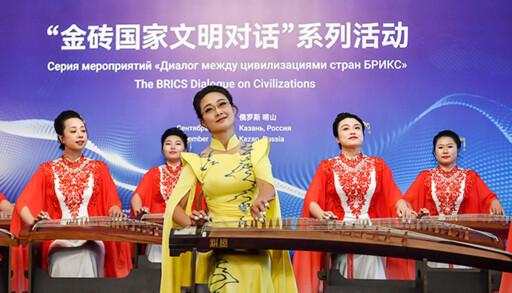


Foreign scholars hail greater BRICS cooperation

Chinese guzheng performers play music classics of BRICS countries at the BRICS Dialogue on Civilizations in Kazan, Russia, on Sept. 25. Photo: XINHUA
In late October, the 16th BRICS Summit took place in Kazan, Russia, marking the first in-person meeting of the bloc’s leaders since its historic expansion. To interpret the outcomes and significance of this summit, CSST interviewed Yaroslav Lissovolik, a member of the Russian International Affairs Council and founder of the think tank BRICS+ Analytics, and William Daldega, a professor from the Institute of Philosophy, Sociology, and Politics at the Federal University of Pelotas in Brazil.
New advances
In his speech at the Kazan summit, Chinese President Xi Jinping called on BRICS countries to work for high-quality development of greater BRICS cooperation. Since its introduction in 2001, the term BRIC, later extended to BRICS and BRICS+, has evolved from a novel economic concept into an irreplaceable multilateral mechanism, expanding from its original four members to encompass broader cooperative initiatives.
Lissovolik pointed out that the BRICS summits are an important barometer of the state of the Global South, its degree of consolidation, and its energy and capacity to transform the global economy. “BRICS summits set important milestones for the economies of the developing world and the entire global economy in terms of policy trends and initiatives directed at improving global economic governance.”
Reflecting on this year’s Kazan summit, Daldega observed that it has consolidated the expansion process announced in January 2024. The introduction of the partner country mechanism at the summit signals a significant challenge ahead: balancing the participation of new members with that of the founding members, especially in terms of group dynamics.
In Lissovolik’s view, the BRICS leaders adopted the right decision to institute the partner country mechanism, or what he called a “partnership belt,” incorporating certain of the developing economies that had earlier applied for BRICS membership.
“Such a partnership belt will not only further increase the weight of BRICS+ on the international stage (including in international financial and economic organizations), but will also widen the scope for plurilateral agreements and alliances within the BRICS+ circle to pursue some of the key initiatives in the economic sphere,” he explained. “Most importantly, the creation of the BRICS partnership belt also shows to other developing economies the openness and inclusiveness of BRICS.”
“As the agenda of BRICS expands to include concrete initiatives in building a new payment system [BRICS Pay], the relevance of BRICS for global financial markets is further increased,” Lissovolik added.
Appeal of BRICS
In recent years, there is an increasing interest from candidates wishing to join BRICS. “Its attractiveness stems from both its geographic diversity, representing the Global South across continents, and its economic relevance, as it unites leading developing economies,” Daldega said. “The group has managed to reconcile differing interests and aspirations through diplomatic dialogue.”
Lissovolik concurred, emphasizing that the BRICS+ platform has become an important gateway for resolving disputes within the developing world. The Kazan summit featured critical discussions and agreements aimed at bridging divisions among developing countries. These advances can be further improved in the coming years, with BRICS also explicitly delineating solutions and approaches to global challenges in their final summit declaration.
“With greater focus and pragmatism, BRICS will be in a position to deliver decisive contributions to resolving global economic challenges and making tangible progress in reforming global economic governance,” Lissovolik said.
China’s role
Since the establishment of BRICS in 2009, China has been committed to improving its mechanisms and maintaining cooperation among its members. Daldega affirmed that China has undeniably been a major actor within BRICS and a catalyst for initiatives within the group, noting that its political and economic influence underpins the bloc’s resilience and appeal. While partner nations benefit from close ties with a country of China’s stature, China, in turn, consolidates its status as an emerging or developing economy and expands trade and investment opportunities within the group.
Development has always been a core objective for BRICS. For members, development is essential to sustaining their own growth and influence. For China, the development of its BRICS partners is particularly important, as these nations are key markets for Chinese exports and capital, Daldega explained.
“Going forward, the success of the BRICS project depends to a significant degree on China’s economic success and its ability to imbue the bloc’s agenda with pragmatic economic priorities,” Lissovolik noted. “I would also not exclude the possibility of further innovations coming from China in making the BRICS+ platform even more inclusive and open—perhaps with respect to the advanced world as well—to the degree that BRICS+ could become the key platform for relaunching the economic globalization process on a more equitable and sustainable basis,” he concluded.
Editor:Yu Hui
Copyright©2023 CSSN All Rights Reserved